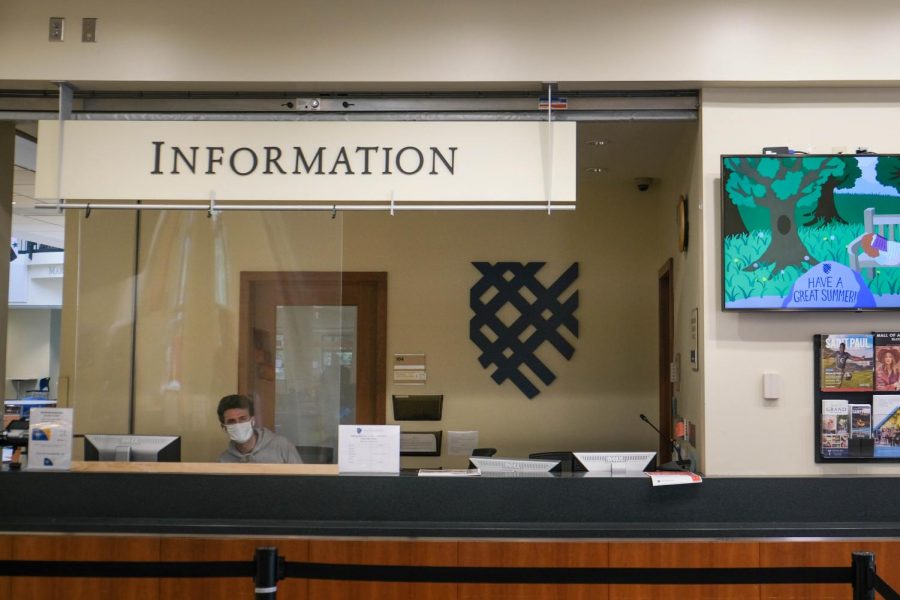Macalester launches insurance program for unemployed student workers
The info desk at the Campus Center. Photo by Malcolm Cooke ’21.
September 17, 2020
On Sept. 4, Macalester opened up applications for its new Macalester Student Unemployment Insurance Program (MSUIP), a plan for students who have yet to secure a work study position due to limitations in the student job market resulting from COVID-19.
Assistant Vice President of Admissions and Financial Aid Brian Lindeman announced the launch of MSUIP in an email on Aug. 17. The Mac Daily later officially advertised details about the program, including a webpage with a link to an application form.
The program will reimburse unemployed students with up to 50 percent of the maximum possible earnings they could have made during the fall semester. Many campus services will operate differently this semester due to the pandemic and, in some cases, will be unable to employ students to the same capacity as usual. Many students have already been laid off, too.
With support from the Financial Aid Office, Macalester Student Employment is accepting applications for financial assistance on a rolling basis. However, they hope that students apply as soon as possible so that eligible students receive their first payment on Sept. 18, the first pay date for the fall semester.
In order to receive assistance, however, students must meet five criteria according to the MSUIP webpage:
Students must, for example, have work study as part of their financial aid package. Student employees whose employment is not part of a work study financial aid award do not qualify for MSUIP assistance.
In order to qualify, students must also have been unable to secure an on-campus job. This includes students who have yet to receive a job offer, as well as students who have declined offers they received due to any extenuating circumstances relating to COVID-19 safety or otherwise.
Lindeman described the Student Employment Office’s response as a dialogue considering the applicant’s job search process — whether or not available positions are appropriate for the student in question.
“If at the end of that dialogue, we have a student who can’t find a position to earn their money, then that’s a student who’s going to be eligible for those MSUIP payments,” Lindeman said.
The application for MSUIP also requires that students are “experiencing financial hardship due to inability to earn wages through student employment.” Though Lindeman said that students who receive need-based financial aid need not take further steps to demonstrate that they meet this requirement, the language is meant to clarify the purpose of MSUIP.
“The subliminal message is that, if you’re in a situation where you don’t need any money, then don’t ask for MSUIP,” Lindeman noted.
The MSUIP also requires that students are physically residing in the United States, meaning that international students currently living outside the United States are ineligible for the program.. However, Lindeman noted that international students who need financial assistance can apply for assistance through Macalester’s Emergency Aid program.
Lindeman also said that, in most cases, students outside the United States are in a situation where living costs are lower than on-campus housing, reducing the need for student employment aid.
The final eligibility requirement on the MSUIP webpage has generated some confusion among applicants: “Students may not qualify for MSUIP assistance if there are positions actively available and posted in JobX.”
“[In the first email] they made it seem like it was going to be this great, sweeping umbrella to take care of all the students, and now it’s a very narrow, pick-and-choose sort of program,” Gus Kuhnen ’22, a student living off-campus who applied for the program, said.
The Student Employment Office responded to Kuhnen’s application by encouraging him to continue applying for the open positions via JobX before he could receive MSUIP. He had yet to receive an offer for any of the positions for which he had already applied.
At the same time, other students in a similar position received confirmation that they would be eligible for MSUIP payments within days of their application.
Karsten Beling ’22, who had also applied for positions but had yet to receive an offer, was accepted into the program. Like Kuhnen, Beling lives off-campus near Macalester. He said he was glad that Macalester is offering unemployment insurance.
“Speaking as a transfer student, I know my last college isn’t doing this,” Beling said.
The website from Financial Aid does not specify why some students may be directed to continue a job search, but some might not. Lindeman said that Macalester may stop accepting MSUIP applicants if positions remain open on JobX, but may make exceptions based on health reasons or a student’s location and limitations on remote work .
“If the job market were to return and we would have plenty of positions available, then I think, effectively, MSUIP would end,” Lindeman said. “That’s really what we hoped for. MSUIP is just kind of a safety net if we’re not in that situation.”
But it is unknown whether or not this is, or will be, the case. Until then, Kuhnen suggested the college should better clarify who does and who does not qualify for the program.
“Spell out the language for their criteria incredibly precisely,” Kuhnen said. “Really tell the students exactly what this program is for, exactly what things they’re looking at.”
Kuhnen is grateful to have since found a student employment position.
Lindeman isn’t sure if MSUIP will continue through the rest of the year.
“We don’t have approval to continue MSUIP through modules three and four at this point, but if we’re in the same situation, I think that’s what I would hope to do,” he said.













